Staying Sane during Social Distancing in April 2020
We remember how we felt in a situation long after the memory of what we did has faded.
When I look back on the Corona pandemic and how we lived through it, I would like to remember it as a time growth as a family, a time of crafting, fun and creativity, but also a time of applying skills we learned during other transitions to get through this change in our lives. I want to be able to say we modelled behaviour for our children that showed we can cope (well) in situations that are out of our control by being calm and taking action where we can. I hope they learn skills such as resilience and adaptability that will help them as they face new challenges in their lives. I want to re-learn silliness and living day-to-day from our kids I still want to love my whole family by the end of it and not have gone completely out of my mind.
Sundae Schneider-Bean, intercultural strategist and creator of Adapt & Succeed Abroad has set us a challenge for our current situation:
Make this the BEST worst time ever.
A tall order. But why not try?
We are now into week four of social distancing in Germany. I firmly believe that our expat lives have prepared us well for times of uncertainty and indefinite waiting so that we are thus far handling the COVID-19 situation reasonably well. We are used to spending a lot of time together as a family and not having many other people for face-to-face social interaction.
There are a few challenges but I also see many good things coming from the forced slowing down of daily life and more time spent together. This observation has been shared by fellow expats and non globally mobile friends alike. We are all connecting and creating more than ever. This is an unexpected but certainly not unwelcome side-effect of the Corona crisis.
What is truly important to you? Now is the time to focus on it. But not stress about it.


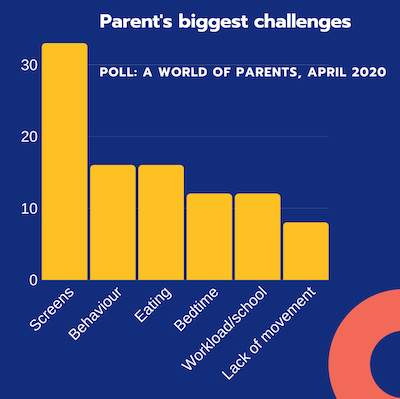
Stressful situations
We feel stressed when we loose control. A lot of things are out of our control right now but there are areas where we can regain some control and reduce stresses. It is worth it – much research has been done on the physical changes to our brain during periods of stress and the impact of stress on our bodies and most of it is not beneficial. Anecdotal evidence suggests transitions, such as those regularly experienced by the globally mobile, reduce our brain functionality by 40%. If this is true, we need to be very mindful of how we use and care for the remaining 60%. Ongoing stress can also have a negative, most likely long-term impact on our bodies. All the more reason to manage our current stressful situations well.
In addition to the overall situation of social isolation, worry about distant relatives and their immediate family’s well being, parents are facing challenges we have never known before. Many are home schooling while trying to work from home themselves and are feeling overwhelmed by the situation. A poll of 45 international parents revealed that over 30% are concerned with the amount of screen time their children are getting. Other issues are behaviour problems, excessive snacking and lack of exercise (for children and parents) and difficulty sleeping. In this post, I would like to share what is currently working for us to keep the peace and stay as sane and well rested as possible.
The COVID-19 pandemic is much like a transition for our minds, bodies and emotions. All the tools and coping mechanisms we have learned and usually use during international moves and transitions can be used now as well. In fact, you have probably defaulted to them already. My research has shown that many expats are not having a particularly hard time adjusting to the changes required of them right now – in fact they tend to fondly recall other situations where they were required to go into lock-down or felt isolated and came out the other side more experienced and resilient than before.
Everyone has their own methods for coping. Some may work better than others and may need to be adjusted. A Harvard Medical School study (https://www.health.harvard.edu/mind-and-mood/protect-your-brain-from-stress) suggests the following methods for protecting our minds from damaging stress: Establish some control (routine), get enough sleep, get organized (plan your tasks & days), get help if you need it (connect with people), and change your attitude.
Recipe for staying sane
The Harvard research resonates with me and confirms much of what we are doing already. Simply put, my recipe for managing stress and staying sane is:
Take equal parts
- Planning
- Routines
- Daily movement
Wrap it all in large servings of love and sprinkle liberally with laughter.
Serve with a side of mutual agreements (see above) and consideration!
Keep in mind – recipes can be adapted. Use this as a guide to make your own sanity saver, depending on your own resources and needs.
What this means specifically for us is that we plan our meals, shopping, school work, crafts, activities, etc. This gives us things to look forward to, minimizes trips to the store and allows me to have crafts ready when needed. Plan things for yourself, too if you have extra time on your hands. Keeping your hands and mind busy will help if you are feeling mild anxiety. If, however, you are feeling very anxious or unable to function, please get professional help. Speak to a mental health expert, trained to help you.
We try to stick to a regular schedule on week days and we get moving every day; outside if possible. This helps with boredom, reduces the impact of sitting around all day on our bodies and minds and improves sleep.
Things are not always going to go according to plan and schedule but this does give us structure and a measure of control, reducing stress. The key ingredient though is LOVE. Love for our children and others is hugely important, however, we must first and foremost take care of ourselves.
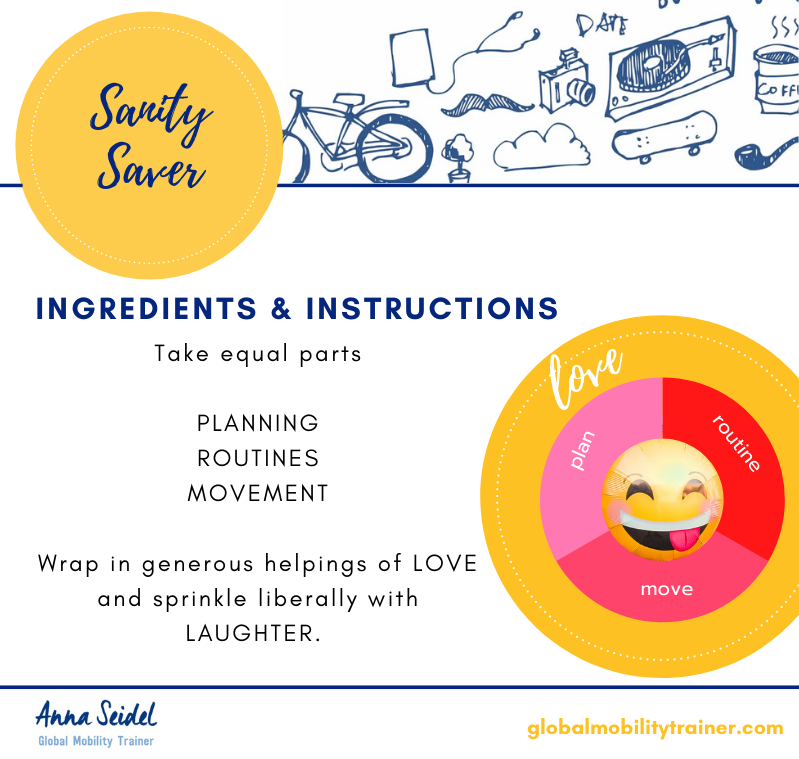

LOVE: self-care
As frequent travelers we have heard the airplane safety warnings more often than we can count: “put the oxygen mask on yourself before helping others.” But how many of us have ever stopped to ask ourselves “why?”. You have 12seconds to get the mask on and start breathing the provided oxygen before negative effects set in. If you use this time to help someone else, you may pass out, after which you are no help to anyone. If you get yourself sorted, you will be available and clear headed to help others.
If I am not well, I cannot care for my family. So, put your mask on first. Take care of yourself. As parents we may struggle with this. If you do, think of yourself as one of your children and take care of yourself accordingly. Make time – plan it! – to do something that will help you recharge your batteries. Areas to think about are nutrition, exercise/movement, sleep, mental breaks, creating something, connecting with others, having downtime, and making time for spirituality. See Routines, below for Dr. Daniel Siegel’s model for a healthy mind.
Self-care sounds elaborate and involved but it doesn’t have to be about (currently unavailable) massages, manicures and green smoothies. An accumulation of small acts of kindness towards ourselves is more valuable, more effective and more realistic. For me this means a 10min morning stretch before the kids are up and going for a run 3 times a week. I fill a large water bottle in the mornings and try to finish it during the day. Sometimes my bathroom breaks are longer than usual because, let’s be honest, it’s a place to hide away for a few moments of peace (usually). I’ve also learned a simple breathing/hand massage that I can do anywhere, anytime, unobtrusively when I need to calm down. And finally, when it’s all too much, I let my kids know that Mom needs a time-out and I find a solitary spot for a break. Our youngest is 6 so it’s not unreasonable to expect her to leave me alone for a little while, when it’s been clearly communicated. With babies and toddlers you will need to find other ways to take a breather. But I encourage you – identify what your needs are and find creative ways to fulfill them.
For my birthday last week, I really wanted to meet and connect with our new neighbors. Since an invitation to coffee was out of the question, we baked cookies and dropped them off at everyone’s door with a note. The response blew me away. I received phone calls, video messages of people singing happy birthday, and a number of flowers and gifts, delivered to my door at a safe distance. I had managed to fulfill my needs while putting a smile on a lot of faces, not the least of which was mine.
You cannot pour from an empty glass, whether it’s a sippy cup or a champagne flute, so you need to refill yours daily. Do it for your children, if nothing else. You are no use to them if your battery is dead. Be kind and considerate to yourself. You are doing the best you can in a hard situation.
LOVE: others
With your glass full(er) you can shower your children with the love they deserve. We need to remember that these times are also stressful for them. As expat children they are more used to disruptions in their lives but they should not be expected to handle their emotions on their own. Be aware of your children, talk with them in an appropriate way and remember that any change in behavior (anger, withdrawal, clinging, needy, giddy, grumpy, regressive behavior, …) may be a stress signal. I agree with Ulrika Ernvik in her book Third Culture Kids, A gift to care for: “I strongly believe that children never act out because it is fun. There is always a reason behind their behavior.” It is up to us to dig deeper and help them sort through what is going on.
An helpful model for how to connect with our children is that of the 5 Love Language (Gary Chapman, 2015). Learn what your children’s primary love language is and make sure you fill their “love tank” daily. Gary Chapman’s website is a good starting point: https://www.5lovelanguages.com. Big Life Journal has some specific recommendations on how to connect using the love languages: https://biglifejournal.com/blogs/blog/connect-child-activities-love-languages. Our children all have strong needs to physically connect with us so they need lots of hugs and cuddles throughout the day. Even our tween.
Your partner is also experiencing different stress levels than usual. If he or she is usually in an office, getting used to working from home takes time and can be harrowing for everyone. The work they are doing may have changed, perhaps they are dealing with layoffs, changes in work load, and making difficult decisions, any of which means they are dealing with another kind of transition. Or they are used to having much more time to themselves and are now having to adjust to the whole family being around all the time. As expats, we are often privileged to have help with the household, laundry, shopping, gardening and childcare. Not having this while we keep as many people as possible safely at home is an added stressor and takes some adjustment.
Everyone is dealing with the changes in a different way. Be considerate, talk about your challenges, frustrations and fears, and show each other some love. By the way, the 5 love languages apply to adults, too.

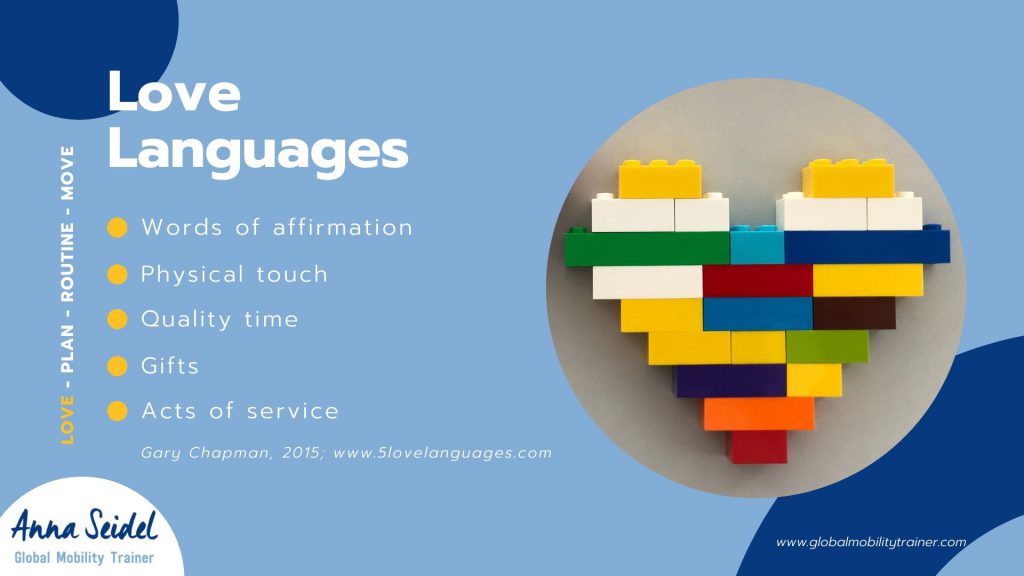

part 1: Plan
One way to take back control in new situations, manage our workloads, and coordinate an entire household (especially without outside help) is to plan. Before you start making lists, ask yourself “What is important to me?”. Build your plan according to your answer.
We plan and schedule our days and activities such as:
- … school work – we plan the week out and discuss daily tasks
- … menus & shopping so we don’t have to go to the store more than 1-2 a week.
- … a daily craft or activity (see some suggestions in list, above)
- … movement
- … chores (clean up, dinner duty, laundry, bathrooms, vacuuming)
- … some special events (game nights, competitions, camping in the living room (you can make s’mores over a candle!), …)
We also consciously connect with people
- … in our household (talk, listen, read, cuddle)
- … friends (send messages, drop notes in their mailboxes, write letters)
- … family (schedule video calls)
part 2: Routines & Schedules
Having moved a few times with children we understand the importance of getting into a routine in helping us adjust to new situations. Dr. Daniel Siegel has developed a model for the components that he believes should make up everyone’s day to achieve and maintain a healthy mind. The Healthy Mind Platter model was developed for everyone, not specifically for transitions but it provides a welcome guide for things to consider as we figure out how to spend and structure our days. If you’re interested in more information, please check his website: https://www.drdansiegel.com/resources/healthy_mind_platter/
Personal experience, the Harvard Medical study, and Dr. Siegel’s model all emphasize the importance of routines and schedules in minimizing feelings of stress by giving us a sense of control over our lives and structure to our days. If you are feeling out of control, I suggest establishing some routines. If they are not used to having them in place your children may initially resist but will ultimately thank you for it as structure gives everyone stability and security.
Our weekday routine looks something like this:
- Breakfast at 8:00
- Make your bed & get dressed
- Do school work
- Break to eat & reconnect
- More school or free time, read
- Lunch
- Practice instruments
- Get moving
- Call someone
- Free play/craft/read
- Do chores
- Help with dinner
- Bedtime
We find that often the days are so full, there is no time for screens (beyond homework and calls) and sometimes we don’t get around to doing everything we wanted to do. That is intentional. I spend some evenings every week planning & researching activities, tasks, and movement options so there is always enough to do for everyone.

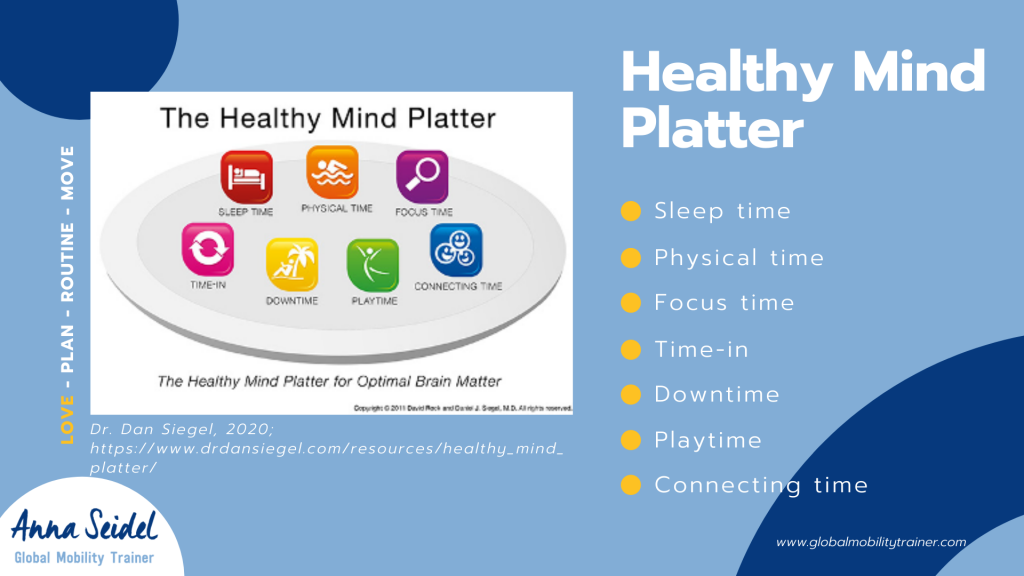
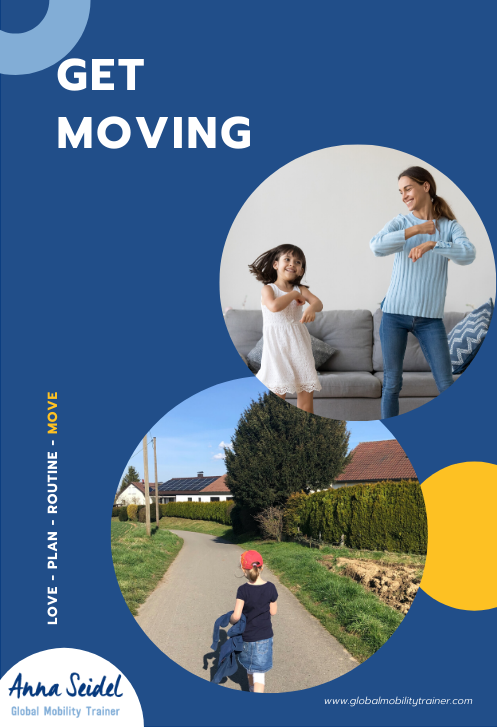
Part 3: Get Moving
There should be no doubt in anyone’s mind in 2020 as to the importance of movement for a healthy mind and body. Our body is involved in our thought processes, understanding, emotions and decision making. Dr. James Levine, M.D., Ph.D., director of Obesity Solutions at Mayo Clinic in Arizona and Arizona State University has even found that “physical movement benefits school performance. It can increase children’s grades by 10 to 15 percent.” (https://www.mayoclinichealthsystem.org/hometown-health/featured-topic/the-importance-of-movement)
Our bodies are designed to move but it isn’t always easy to get going. Especially when we have to stay inside and inertia has pretty much set in. So, keep it interesting and mix it up with a variety of movement options – let everyone contribute ideas. Some of ours include: turn up the music and dance like nobody’s watching, guided video (e.g. YouTube), walk/run outside, play hopscotch (inside on brown paper), play twister, do yoga (find an app you like), stretch, get older kids to plan something for younger children, have table tennis/football tournaments, create an indoor or outdoor parkour course, … there are many, many options once your creative juices start flowing. Just get moving. And if you can – get outside. The added benefits of a change of scenery, fresh air and – if you’re really lucky – sunshine are enormous.
spice it up: Laughter is the best medicine
Our final ingredient, the secret sauce to keeping the stress monsters at bay and staying sane is laughter. But it is an ingredient that isn’t always easy to source. Some days there seems to be a shortage of it, similar to toilet paper or flour. When we are stressed and worried, everything can become a spark that lights the fire of our anger. Even small, inconsequential things that wouldn’t normally bother us.
Those of us lucky enough to have children in our lives that lighten the mood and still know how to live life fully in the moment should take their lead and enjoy the good, silly, happy moments. In our house we have a codeword, to be used when someone thinks we are reacting too strongly or taking something too seriously. The idea is to remind us to put whatever just happened into perspective and tone down our reaction. If you don’t have kids or a partner to help with this – find something else that tickles your funny bone. Watch a silly clip on YouTube. Or cartoons from your childhood. We recently introduced our kids to Mr. Bean, something we all thoroughly enjoyed.
Please, try to laugh, be silly and find something to be thankful for every day – most of us really have so much to be grateful for. Now is the time to remember that and find joy in the smallest of things. Because, why not?
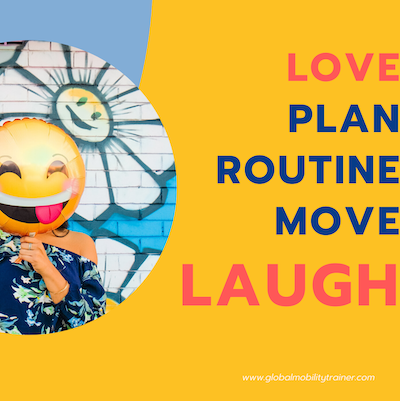
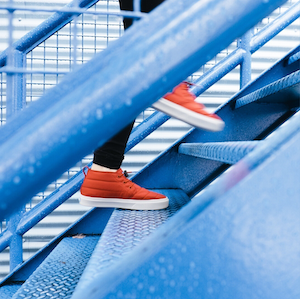
One step at a time
Finally, in the moments where it is all too much, remember to be kind to yourself and take things one step at a time. Baby steps. Open a window for some air. Take three deep breaths. Turn off the news. Drink an extra glass of water. Hug your kids. Take a shower. Celebrate your achievements. You are taking small steps. They will add up and carry you through each day and get you through this.
Stronger. Wiser. More resilient. You got this.




